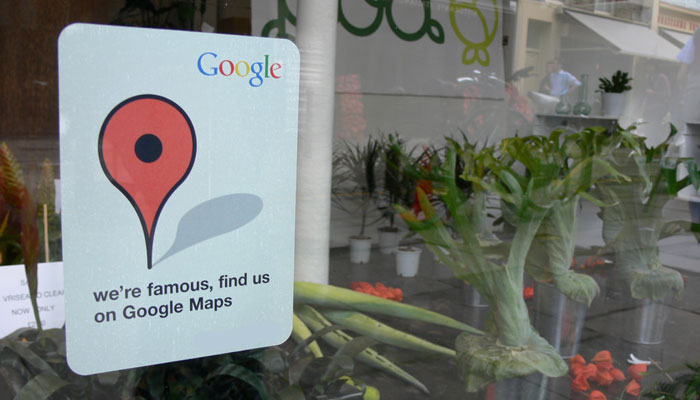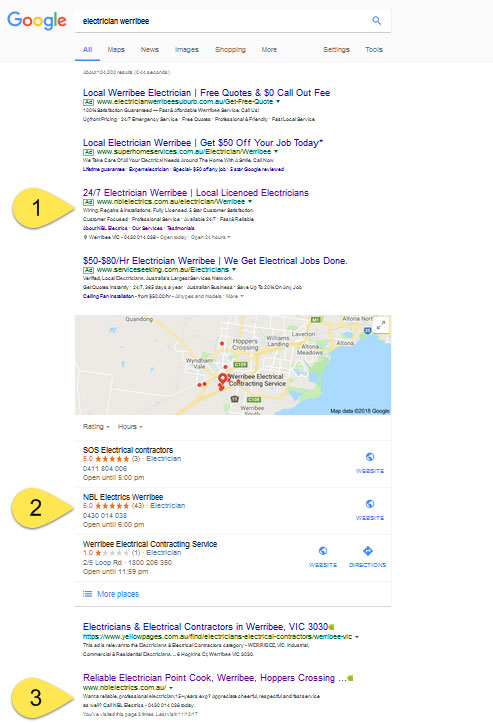How Not to Get Ripped Off by SEO Providers: Part 2 About Local SEO

Our mission is to provide business owners with useful, practical help on commonsense marketing techniques that work. We’re not interested in gimmicks and the latest fads. We’re only interested in affordable, proven strategies that work. SEO – when done properly – is one of them.
In part 1 of Our How Not to Get Ripped Off by SEO Providers Guide we tackled Onsite SEO. In this article, we look at Local SEO.
Do you need local SEO?
If you run a business that relies on people in your local area finding you, then yes you do. Think of any shop, restaurant, tradie, professional service etc whose main customer base is locals.
Yes, although some people still use printed phone books (your grannie?) - most people use the internet to find information about local businesses. Here are some recent statistics:
- 96% of PC owners conduct local searches.
- 46% of all Google searches are local.
- 64% of local customers use search engines and directories as their main way to find local businesses.
- 50% of local mobile searchers look for business information (like a company’s address or phone number).
- A whopping 78% of local mobile searches result in an offline purchase.
If you run an online business or a national/international business that doesn’t necessarily need to attract local business, then you probably don’t.
What is local SEO?
The onsite optimisation tips we covered in Part 1 relate to making your website discoverable by search engines and moving it up the ranks so that it is found when people do searches on popular industry terms.
Eg: “how to remove paint fumes, mortgage rates, plus size clothing, how to grow tomatoes, flights to Sydney, email marketing systems,” etc.
Local SEO is entirely centred on targeting the specific region(s) that the business serves. This involves optimising for more specific keywords and limited to these locations.
Eg: “Gold Coast painters, roof restoration Brisbane, Italian restaurant, divorce lawyer, bus timetable” etc.
Here’s a quote from Google's documentation on "How to improve your local ranking": “Local results appear for people who search for businesses and places near their location. Local results are based primarily on relevance, distance, and prominence. These factors are combined to help find the best match for your search. For example, Google algorithms might decide that a business that's farther away from your location is more likely to have what you're looking for than a closer business, and therefore rank it higher in local results.”
So what this means is, that Google will use your location to display results that are nearby and relevant.
How do you get ranked high in local search results?
There are several ways to do this. Before delving into this though, it’s important to clarify where your business needs to show up.
Here are the results on page one of Google for a search on “Electrician Werribee”.

NBL Electrics is in the enviable position of showing up on the first page of Google search results in three places. Firstly in Google Adwords at the top of the page, secondly in the Local Pack and thirdly in the organic search area, meaning that they are dominating first page results.
Was this quick to achieve? No. We put a lot of time and effort into Local and onsite SEO strategies to get them to these organic positions. But as you can see it’s paid off, which means they no longer need to rely on Google Adwords to appear on page 1, and could effectively turn the ad off and save money.
The fourth position where a business could appear on page 1 of search results is in the Google Map. You have the choice of whether you want your business location to be highlighted on Google Maps with a pin. If you operate bricks and mortar business – then definitely do this. If you operate from home, then we recommend hiding your address.
Common local SEO mistakes
You need to do more than just claim your free Google Business Profile listing. You need to optimise it correctly. Here are some of the problems we see frequently.
- Name variations. Make sure the business name you provide is indeed the exact name of your business. Not a permutation of it. Eg: Fabulous Fencing is not the same as Fabulous Fencing Pty Ltd. Consistency across your all citations (listings) and website is very important.
- Address variations. Like your name, your business address should be consistent with how it appears elsewhere – like on your website and in other listings. It helps Google to understand your address and put the map pin in the right place.
- Phone variations. As with the address, the phone number should match the number on the location page of your website and be consistent across all citations throughout the web.
- Website URL. The website URL should ideally go to a specific location page on your website, with a matching name, address and phone number (NAP).
- Too many categories. Ensure you choose the most accurate category first and maybe just one or two more. Don’t be tempted to choose heaps of categories.
- Multi-Location Inconsistency. If you have several business addresses, be consistent from one location to the next. Ensure categories and names are the same, and try to use local numbers and location page URLs relevant to each location.
- Tell a story and build trust by filling out your profile with an engaging and accurate description of your services and benefits. Include photos and a virtual tour if you believe it will add value.
- Few or No Reviews. These important survey results from Bright Local say it all. You need to provide a great experience, and then encourage customers to leave reviews, and always respond to reviews.
- 74% of consumers say that positive reviews make them trust a local business more.
- 7 out of 10 consumers will leave a review for a business if they're asked to review it.
- 84% of people trust online reviews as much as a personal recommendation.
Once the Google Business Profile listings have been optimised correctly, then it’s time to concentrate on strategies to get the listings to show up in the all-important Local Pack, on position 1, 2 or 3.
And like all SEO strategies – we need to follow Google's Guidelines for representing your business to avoid any penalties or manual actions.
Shady local SEO provider claims and practices
Here are just some of the amazing promises and shady tactics we’ve seen from overnight SEO gurus. Some of them relate specifically to local SEO strategies, and the rest to website SEO practices. The two are intertwined – in that Local SEO requires some onsite and offsite SEO strategies.
In Google’s own words: “Beware of SEOs that claim to guarantee rankings, allege a "special relationship" with Google, or advertise a "priority submit" to Google. There is no priority submit for Google.”
Here’s what to look out for:
- Charges a hefty fee for setting up and optimising your Google Business Profile listings. These do not take long to set up correctly. What does take time is setting up multiple listings and location pages.
- Put identical information (including NAP) on all your Google Business Profile listings.
- Doesn’t request company information and images, and doesn’t ask for approval of what they’ve created.
- Doesn’t provide you with recommendations and a plan for the local SEO campaign. You have no idea what they are going to do.
- Doesn’t provide a full list of citations, or citations that are registered with an email address and password that you have access to so you can check that they have been entered correctly and with consistency.
- Guarantees ranking on page 1. You’ll find that is usually for obscure, long keyword phrases you would get anyway and are useless because no one is searching on them. In any case, there is no guarantee with Google.
- Doesn’t provide weekly or monthly comparative reports so you can how your keyword rankings have changed over time in Google Local results and Google Search results. Or if they do provide these reports – they’re manually generated and entered into a spreadsheet or Word doc. These will be false.
- Promises to submit your site to thousands of search engines or directories. This will have a negative effect on your ranking results with the major search engines, particularly if it’s done quickly. A major increase in backlinks is a big warning to Google. It means most of the links will be from fake" search engines, link farms, spyware, or scumware.
- You can’t find the company on Google.
- Use a free email address – like Gmail, Hotmail or Yahoo – to contact you.
- Puts links to their other clients on doorway pages on your site. You need to check the source code of every page for hidden external links.
- Offers to sell keywords in the address bar. Not possible.
Also, beware of the pricing. This can work both ways.
- If any company ever offers a free SEO service – forget it. What they will request is access to your hosting account and/or your FTP username/password, so they can do unspeakable things to your site.
- Conversely, if a company quotes thousands of dollars for setup, onsite SEO and monthly management, ask for a detailed breakdown of costs and call at least three of their clients. Some companies trade on client ignorance and charge outrageous fees for very little service.
Achieving excellent results for Local SEO is hard work. It involves a series of steps, including location pages, citations, keyword selection, content preparation, reviews and building quality links. It takes time and constant fine-tuning to generate the best results – getting your keywords and locations on Page 1 of Google. The key to success lies in the knowledge, skills, practices and results of the SEO Provider.
The next step
We learned these lessons the hard way. We used to sub-contract SEO for our sites and our client’s sites out to “Australian SEO Providers”. We interviewed and tested three companies over 12 months. All promised the world and failed to deliver acceptable results. The copywriting was completed by people with English as a second language, the onsite SEO was not done correctly, and many of the so-called citations were nothing more than listings on link farms. The worst part was the total lack of customer service.
We now have our own in-house Australian-based Local SEO team member who has many years of experience and is a true SEO geek. Lisa has worked on many campaigns for our clients in the construction, accommodation, IT and professional services sectors and has succeeded in getting every client’s business into the 3-Pack, and organic results on page 1 for several keywords and locations. Clients love receiving detailed weekly reports and monthly review phone calls and seeing their progress against competitors. Most of all they appreciate having it all explained and presented with total transparency.
If you would like us to review your business and see how well it’s performing in local SEO searches, simply request our Local SEO review here.
We’ll undertake an analysis and send you the results. If we think there is scope for you to improve your local SEO results, we’ll provide some recommendations.
When done correctly, using White Hat practices, Local SEO is the most cost effective marketing strategy there is for attracting local customers into your business, and you'll reap the benefits for a long time to come.

